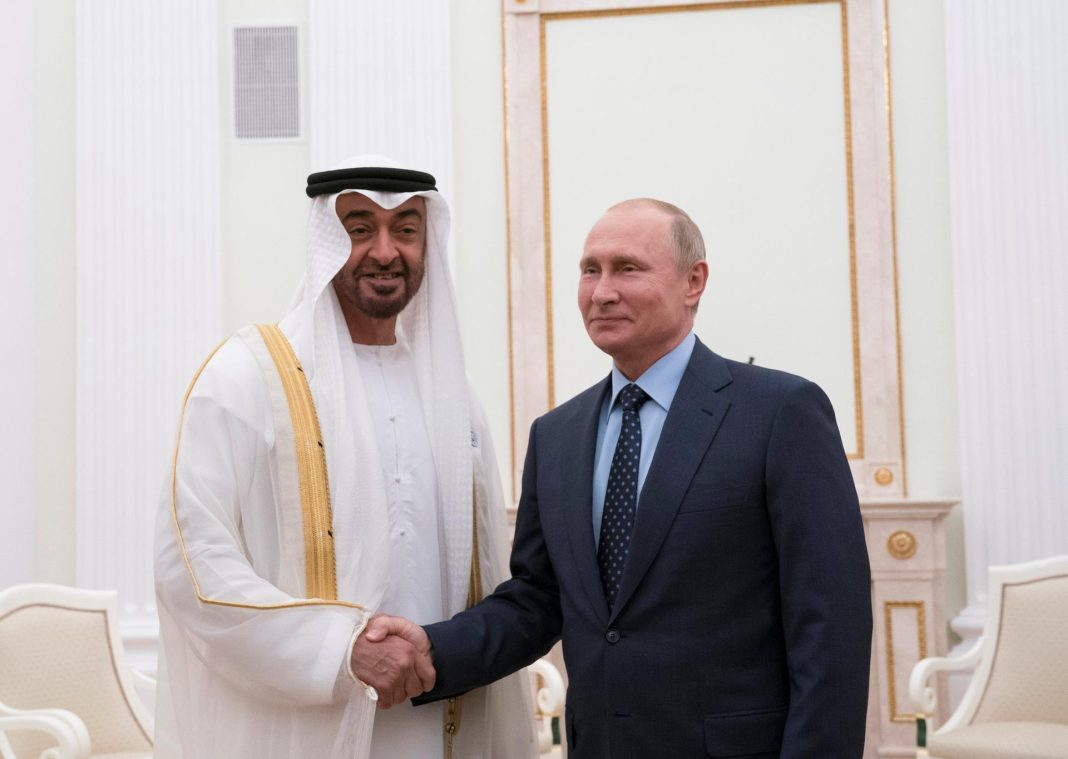Officials from Washington and European capitals are visiting the UAE this week where they will raise concerns with their Emirati counterparts about the trade of dual-use products like computer chips and electronic devices, according to the WSJ.
The visit is not surprising. For months now, senior US officials have publicly labelled the UAE “a country of focus” as they look to clamp down on Russia’s evasion of Western sanctions.
The UAE is a key US partner in counterterrorism operations, but like its larger neighbour, Saudi Arabia, has increasingly pursued a path independent from the West on foreign policy.
It has staked out a neutral position on Russia’s invasion of Ukraine, keeping economic and diplomatic channels with the Kremlin open. In June, Emirati President Sheikh Mohammed bin Zayed met Russian President Vladimir Putin in St Petersburg during an economic forum.
The UAE has reaped financial dividends from its diplomatic position.
Dubai, perhaps the flashiest of the UAE’s seven Emirates, has been one of the biggest beneficiaries. An influx of Russian emigres has helped turbocharge the city’s property scene, making it the world’s fourth most active luxury home market behind New York, Los Angeles and London this year. The city-state has also become a hub for Russian oil traders at a time when it is competing to attract international business with Saudi Arabia.
For their part, Emirati officials have not been squeamish about deepening economic ties with Moscow despite western pressure. UAE Trade Minister Thani bin Ahmed Al-Zeyoudi pledged last December to push commercial relations “to even greater heights” after the UAE reported non-oil trade with Russia growing by 57 percent in the first nine months of 2022 – breaking all records.
The UAE’s gold industry, a lucrative sector of the economy that has also helped expand Emirati geopolitical clout as far as war-ravaged Sudan, has also enjoyed an uptick in business thanks to trade with Russia. Imports of Russian gold increased about 700 percent the year after Russia’s Ukraine invasion, from 1.3 tonnes during 2021 to 75.7 tonnes, or about $4.3bn worth of the precious metal.
But one of the key concerns for western officials is the re-export of dual-use technologies like semiconductors and integrated circuits which are used in civilian industries, but also military gear.
According to the WSJ, western officials are concerned that the transit of these goods from the West to Russia via the UAE is increasing as Washington and its allies lobby Russia’s neighbours, specifically Armenia, to stem their own booming trade in goods.
As recently as December, the UAE was still exporting drones to Russia, according to Russian government data analysed by the Washington DC-based Free Russia Foundation. The group lists the UAE, along with Turkey, Cyprus and China, as countries that have “dramatically expanded” exports to Russia.
The US banned the export of sensitive technologies to Russia immediately after the invasion of Ukraine, but US officials say the UAE continued to send US-export controlled goods, including “semiconductor devices, some of which can be used on the battlefield”, to Moscow.
According to the Ukraine-based Kyiv School of Economics the UAE exported approximately $144m worth of critical components for Russian Unmanned Aerial Vehicles (UAVs) in the first five months of this year.
For its part, the UAE says that it abides by all international- and UN-imposed sanctions. The tiny Persian Gulf state is also not alone in maintaining economic ties to Russia. Egypt has boosted its purchases of Russian wheat amid the war and Saudi Arabia along with other regional states have purchased discounted Russian crude.
The UAE’s growing trade with Russia pales in comparison to that of NATO-member Turkey, where the value of bilateral goods exchanged has surged about 200 percent even as the war rages. Turkey exported more than double the value of component parts critical to Russia’s drone industry in the first five months of this year, according to the Kyiv School of Economics.
